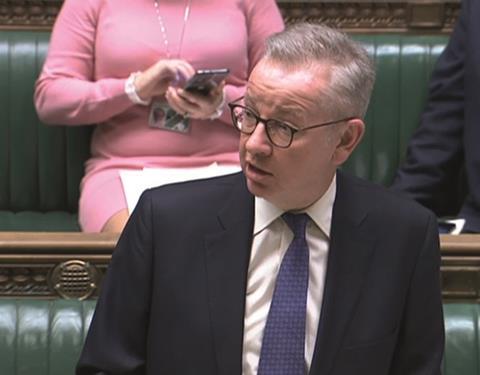Representatives of homebuilders say the government is punishing ‘innocent’ firms for the failures of ‘the few’
Housebuilders have hit back at the government’s “anti-development” plan to push ahead with a £3bn levy to pay for fire safety repairs, saying the plan will punish “innocent” firms for the failures of “the few”.
The Department for Levelling Up, Housing and Communities yesterday published a consultation on the ∫⁄∂¥…Á«¯ Safety Levy, through which it plans to raise ¬£3bn over 10 years to pay for the remediation of ‚Äúorphan‚Äù buildings where no owner can be traced.
The department said the plan was on top of £5.1bn already committed by the government to paying to solve post-Grenfell fire safety problems in existing flat blocks, but the industry said the new levy would be in addition to more than £4bn of additional costs already levied upon it.

The levy was originally announced by Michael Gove in April during his first stint as housing secretary as a way to pay to help thousands of leaseholders stuck in blocks of flats now seen as unsafe but without adequate routes to fund repairs.
However, housebuilders have consistently argued that they have paid to repair their own buildings via the £2bn cladding pledge, as well as having contributed an estimated £2bn to £3bn via the Residential Property Developer Tax, and shouldn’t have to pay again via a new levy.
Stewart Baseley, executive chair of the Home Builders’ Federation, said UK housebuilders were committed to helping leaseholders by remediating the buildings they built but that the levy was the sign of an “increasingly anti-development and anti-business policy regime” which had “serious implications for home ownership, investment and jobs”.
Yesterday’s consultation admitted that the levy had the ability to impact upon scheme viability, “which in turn would affect the overall numbers of homes being built”.
>> See also Gove’s return could mean a fight with housebuilders is on the cards
Baseley said: “In the midst of a recession, it is disappointing for government to create more barriers to investment with a move that will further threaten supply, in particular of affordable homes.
‚Äú∫⁄∂¥…Á«¯ new homes may not be politically attractive but the country faces an acute housing affordability crisis and the construction of new homes supports millions of British jobs.‚Äù
He added that government has failed to pursue product manufacturers, with ministers acknowledging that UK housebuilders are easier to tax and threaten.
Meanwhile Rico Wojtulewicz, head of housing and planning policy at the National Federation of Builders, which represent SME housebuilders, said the government was targeting the whole development industry to pay for problems created by a small number of developers and builders. He said: “You can’t hold innocent people accountable for failures of the few. The guilty party should pay – but that’s not going to happen under this legislation.”
Under the government’s proposals, builders will have to pay the levy as part of the building control process, with the smallest developments – likely those of under 10 homes – and affordable housing schemes given an exemption from the charge. The department said it had not decided whether to exempt Build to Rent and student housing from the charge.
The consultation also made clear that local authorities will be responsible for collecting the levy, which will be variable depending either upon local or regional valuations, or upon whether schemes are brownfield or greenfield.
The department’s consultation paper said the expected £300m annual revenue raised by the levy was equivalent to just 4% of the development sector’s annual planning contributions in CIL and section 106 agreements.
Launching the consultation yesterday, building safety minister Lee Rowley said: ‚ÄúWe have been clear that developers must pay to fix building safety issues and the ∫⁄∂¥…Á«¯ Safety Levy is an important part of making that a reality.
“By having these plans in place, we can ensure that all leaseholders are protected, regardless of whether their developer has pledged to remediate or not.”



























No comments yet